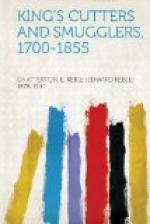Port wines, he said, were purchasable at Dunkirk because these had been taken from English merchantmen by privateers; and since there was little or no market for such wines in Spain they were brought into Dunkirk, whither resorted the smugglers eager to buy them. He proceeded also to explain another method of cheating the customs. Large quantities of very inferior British brandy were taken on board a ship and clearance was obtained for some other English port, but instead of proceeding to the latter the vessel would run across to Dunkirk or Holland, where she would unload the cheap brandy, and in its place take on board some high-priced French brandy equal in quantity to the British commodity which had been put ashore at the French port. After this, with now a much more valuable cargo, the vessel would put to sea again and make for that British port for which originally she had cleared. And as to the practice of bribery, he himself had several times bought permits from the Excise officers to cover smuggled brandy and tea. On one occasion he had paid an officer fifty guineas for a permit to cover a certain quantity of tea and brandy about to be run into the country.
Next came Captain Ebenezer Hartley, who had also formerly commanded a ship that was engaged in smuggling. He had known of large quantities of muslins and silks brought into the country on board East Indiamen. These goods were smuggled by throwing them through the port-holes at night into boats waiting below, alongside the ship, or whilst the Custom officer was being entertained on board with food and drink. Sometimes, he said, this was even done under the very eyes of the Revenue officer, who took no notice of it. He recalled an incident in an earlier part of his life when he had sailed from England to Holland, in which country he had filled up with twenty-six casks of oil. After that his orders were to cross the North Sea and meet a certain vessel which would await him off Aldborough. This last-mentioned craft would give Hartley’s vessel the signal by lowering her jib three times.
A more tragic story was related by George Bridges, a tidesman of the Port of London. He showed that it did not always “pay” to be diligent in one’s duty, for he quoted the case of a Captain Mercer, in the employ of the Custom House, who did now and then make a seizure, but he “was broke for doing his duty”; and when Mercer came into Cork on the occasion in question, the mob set upon him so that he was compelled to escape into the sheriff’s house. The mob then surrounded the house in their thousands until the sheriff interceded with them. They were wild with fury and threatened to pull the house down, until the sheriff gave them his oath that Captain Mercer should never again be guilty of seizing the wool which the smugglers had endeavoured to export. But the mob afterwards went to Passage and took hold of a Custom House officer named May. They brought him forth from his house, cut out his tongue, and cut off his ears, one of which the witness said he remembered seeing nailed on to the Cork Exchange. They dragged the man with a rope round his neck, gave him several blows, hurled him into the river, and finally the poor fellow died of his ill-treatment. Although handsome rewards were offered for the discovery of the offenders, yet no one ever came forward.




